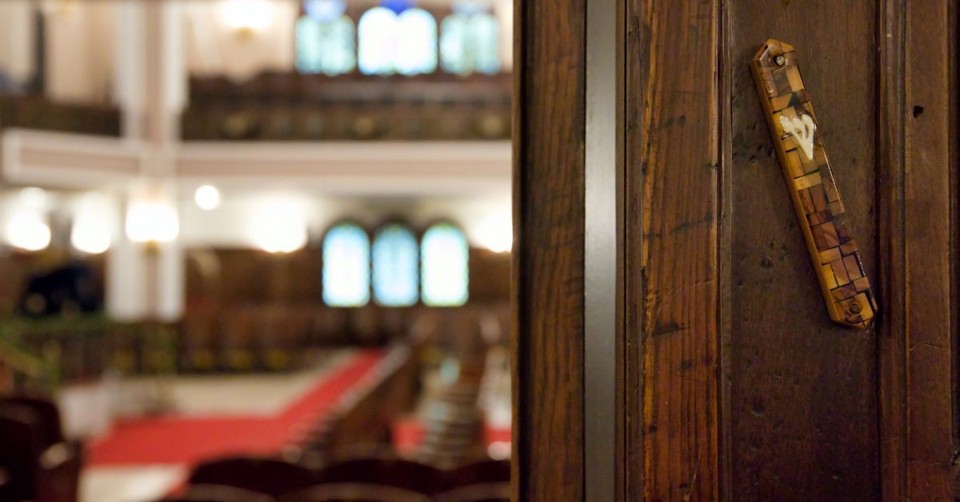What Is the Mezuzah Prayer and Is it Biblical?

If you visit an Orthodox Jewish home, you may see a small, rectangular box attached to the right doorpost. It’s not much bigger than the length of your hand and is only about three inches wide. It is a mezuzah, and it holds a treasure of God’s Word within.
What Is the Mezuzah Prayer?
Mezuzah is the Hebrew word for doorpost. In traditional Jewish homes, they attach a mezuzah to the doorpost of the entrance. It is an oblong container that contains a scroll of parchment paper that is inscribed with Deuteronomy 6:4-9 and Deuteronomy 11:13-21.
Deuteronomy 6:4-9 says:
“Listen, O Israel! The Lord is our God, the Lord alone. And you must love the Lord your God with all your heart, all your soul, and all your strength. And you must commit yourselves wholeheartedly to these commands that I am giving you today. Repeat them again and again to your children. Talk about them when you are at home and when you are on the road, when you are going to bed and when you are getting up. Tie them to your hands and wear them on your forehead as reminders. Write them on the doorposts of your house and on your gates.
Deuteronomy 11:13-21 expands on the same idea:
“If you carefully obey the commands I am giving you today, and if you love the Lord your God and serve him with all your heart and soul, then he will send the rains in their proper seasons—the early and late rains—so you can bring in your harvests of grain, new wine, and olive oil. He will give you lush pastureland for your livestock, and you yourselves will have all you want to eat.
“But be careful. Don’t let your heart be deceived so that you turn away from the Lord and serve and worship other gods. If you do, the Lord’s anger will burn against you. He will shut up the sky and hold back the rain, and the ground will fail to produce its harvests. Then you will quickly die in that good land the Lord is giving you.
“So commit yourselves wholeheartedly to these words of mine. Tie them to your hands and wear them on your forehead as reminders. Teach them to your children. Talk about them when you are at home and when you are on the road, when you are going to bed and when you are getting up. Write them on the doorposts of your house and on your gates, so that as long as the sky remains above the earth, you and your children may flourish in the land the Lord swore to give your ancestors.
Both passages emphasize committing your life to the one true God. The second passage also adds that there are many benefits to committing wholeheartedly to the Lord your God.
They attach a mezuzah to the right doorpost, and it is a sign to guests of the house that there is a strict commitment to El Shaddai observed in the house. The first time the mezuzah is secured to the doorpost, they recite a special blessing. Some Jewish people kiss the mezuzah as they pass by. The blessing or prayer is recited once at the time they put the mezuzah up. They say, “Blessed are you, Lord our God, King of the Universe, Who has made us holy with His commandments and commanded us to affix this mezuzah.”
The mezuzah is also a reminder of the Exodus from Egypt. God’s final plague to scare Pharaoh into letting the Jewish people go was to kill the firstborn of every household in Egypt. However, the Jewish people marked their doorposts with the blood from a sacrificial lamb, and this was a sign to the angel of death to pass over that home. Therefore, the Passover holiday is held every year to celebrate God’s faithfulness in bringing the Jewish people out of slavery in Egypt.
Orthodox Jewish people adhere to many rules for the mezuzah. The text inside should be 22 lines. If there is a mistake in the writing, the mezuzah cannot be used. They connect it to the top third of the doorpost at an angle with the upper part slanted inward. When you sell your house, you must leave the mezuzah. The backside of the rolled parchment paper must have the word Shaddai written so that it can be seen through the opening in the back of the mezuzah case.
Is the Mezuzah Prayer Biblical?
Of course, the two Deuteronomy passages are from the Bible and reliable as solid teaching. But also, when Jesus was asked about the most important commandment, he replied with words from Deuteronomy 6:4-5.
The Lord our God is the one and only Lord. And you must love the Lord your God with all your heart, all your soul, all your mind, and all your strength.’ The second is equally important: ‘Love your neighbor as yourself.’ No other commandment is greater than these.” Mark 12:29-31
There isn’t a hard and fast rule a believer has to have a mezuzah affixed to their house, or to say the mezuzah prayer, but the sentiment of it is sound. We need reminders every day of who we’re living our lives for. The Lord’s faithfulness and love should be at the core of everything we do and speak.
What Are Some Biblical Lessons We Can Learn from the Mezuzah Prayer?
Traditions are Good Reminders. Although you don’t earn points with God by observing traditions, they can be a good reminder of the great God that we serve.
Speak & Teach God’s Word to Others. A mezuzah is a reminder to talk about holy scripture when you are within your home and when you pass it on your way out of the home, it’s a reminder to speak of God as you go about your day.
Your Heart Also Has a Doorway. Remind yourself of God’s love and faithfulness whenever you pass a mezuzah on a doorway. Or even if there isn’t one attached, think about the spiritual mezuzah that is connected to the doorway of your heart. Remind yourself that, as a Christian, God is within your very heart and soul. Therefore, conduct your life accordingly.
Jesus is the Passover Lamb. The mezuzah reminds a Jewish person of the Passover in Egypt that freed them from the bondage of slavery. All people are born slaves to their sinful nature, and Jesus was sent to be a holy sacrificial lamb so that all who believe in Him and His work on the cross will be passed over in the final judgment. Jesus is the way, the truth, and the life. Continually look to Him.
Conclusion
Traditions and symbols aren’t bad, but they can be treated as if obeying the tradition is more important than the message of the symbol. The symbol is only a reminder of a great message from God. It doesn’t have any power.
Whether there is a mezuzah on the outside of your home, believers should always speak of God’s Word, teach it, and pray based on it. We also need to love the Lord with all our heart, soul, mind, and strength and show that love to other people as much as we can.
The rich Jewish traditional history of the Old Testament merges with the faith-based salvation of Jesus in the New Testament and creates a beautiful picture of God’s great love for His people. God so loved the world that He sent His only Son so that all people—Jews and Gentiles—have the chance to open their hearts and believe.
Photo Credit: ©GettyImages/Izzet Safer

This article is part of our Prayer resource meant to inspire and encourage your prayer life when you face uncertain times. Visit our most popular prayers if you are wondering how to pray or what to pray. Remember, the Holy Spirit intercedes for us, and God knows your heart even if you can't find the words to pray.
The Lord’s Prayer
Prayer for Peace
Morning Prayers
Good Night Prayers
Prayer for Healing
Prayer for Protection
Prayer for Anxiety
Prayer for Strength
Now available is our new Daily Prayer devotional and podcast! An easy way to start your day with prayer: read or listen to today’s prayer and sign up to receive it by email.
Originally published July 21, 2022.






